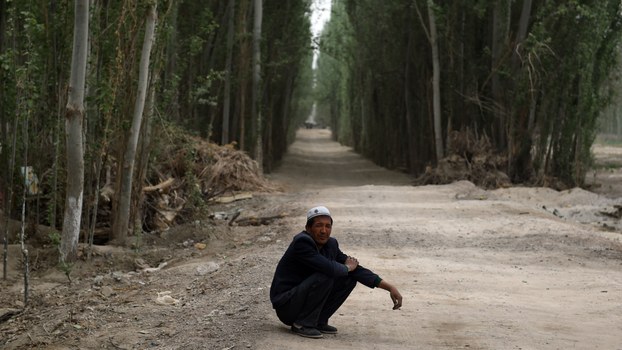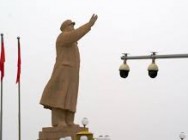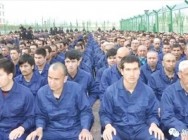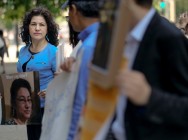Last Minute

- Conflict and Alliance: The US and China: A Centennial Dance: A Century of Relationship from 1900 to 2024
- CHINA RELATIONSEAST TURKESTAN PROBLEM AND TURKEY
- FRONTLINE China Undercover
- Elimination of “Uyghur Counter-Revolutionary Officials” in Academic Fields—Exact Quotes Translated from a Mandarin Audio File
- In Push for Trade Deal, Trump Administration Shelves Sanctions Over China’s Crackdown on Uighurs
- Dalai Lama’s 60th Anniversary Symposium: İlshat Hassan speech in English and Chinese
- Uyghur Detainees from Xinjiang ‘Placed in Nearly Every Prison’ in Shandong Province
- Shahrezad Ghayrat, Unrepresented Women
- Uighur Americans Speak Against China’s Internment Camps. Their Relatives Disappear.
- Rozinisa: The true story of the Uyghur girls in the prison

-

Conflict and Alliance: The US and China: A Centennial Dance: A Century of Relationship from 1900 to 2024
-

CHINA RELATIONSEAST TURKESTAN PROBLEM AND TURKEY
-

FRONTLINE China Undercover
-

Elimination of “Uyghur Counter-Revolutionary Officials” in Academic Fields—Exact Quotes Translated from a Mandarin Audio File
-

In Push for Trade Deal, Trump Administration Shelves Sanctions Over China’s Crackdown on Uighurs
-

Dalai Lama’s 60th Anniversary Symposium: İlshat Hassan speech in English and Chinese
Mandatory Indoctrination Classes For Unemployed Uyghurs in Xinjiang
Authorities in Kashgar (in Chinese, Kashi) prefecture, in northwest China’s Xinjiang region, are forcing unemployed Uyghur males to attend political indoctrination classes to ensure they avoid “activities that affect social stability,” according to official sources.
Since April last year, Uyghurs accused of harboring “extremist” and “politically incorrect” views have been detained in political re-education camps throughout Xinjiang, where members of the ethnic group have long complained of pervasive discrimination, religious repression, and cultural suppression under Chinese rule.
But an officer from the Tomosteng township police station, in Kashgar’s Yarkand (Shache) county, recently told RFA’s Uyghur Service that authorities in the region are additionally requiring idle Uyghurs who are not suspected of committing any offenses to attend political indoctrination classes.
Those made to join the classes are mostly Uyghur males aged 16 to 45 who are out of work because of the seasonal nature of their livelihood, such as farmers, said the officer, who spoke on condition of anonymity.
The officer said the daily classes are “different than the re-education camps,” in that students attend three two-hour sessions in the morning, afternoon and evening, but can return to their homes—unlike the camps, where people are held indefinitely.
“In the mornings, there is a flag-raising ceremony, after which they attend a political study class using material supplied by the Provincial Propaganda Office,” he said.
“Classes are taking place regularly in other townships and villages.”
In Tomosteng, “150-200” residents attend classes, he said, adding that the number fluctuates.
“We assemble everyone and ask them if there are any problems which they have been unable to resolve and what their plans are to resolve them,” he said.
“I personally ask them those questions, as would the village cadres.”
Another officer from Tomosteng told RFA that the indoctrination classes are held at local Family Committee offices or Cultural Centers.
“The classes were arranged by the Family Committee for people to study the Chinese language, [Communist] party regulations, and so on,” said the officer, who also asked to remain unnamed.
“As it is the wintertime [and not farming season], it is also to prevent men from taking part in activities that affect social stability.”
Harassment and abuse
The officers told RFA that on the morning of Jan. 28, a Uyghur named Tursun Ablet had hanged himself at his home in Tomosteng’s No. 1 village because his class administrator had threatened to sentence him to a re-education camp for up to five years if he didn’t learn how to recite China’s national anthem in Mandarin Chinese instead of his native Uyghur language by the following day.
Mandarin Chinese and the Uyghur language—which is Turkic—differ significantly, and Uyghurs speak Chinese at varying levels of proficiency, depending on where they live, how they have been educated, and their occupations.
One of the officers read statements taken from residents familiar with Ablet and his treatment at the training course, which suggested that attendees were regularly abused and harassed if their performance did not meet the expectations of their instructors.
A statement from Ablimit Abliz said that on the morning of Jan. 25, about 200 people aged 16 to 45 attended a training course at Bagh Hoyla Family Committee Hall, and that 17 people in the class—including Ablet—were unable to recite the national anthem when asked to stand and do so.
The head of the Family Committee, Mehmet Tursun Mahmut, told the group that if they could not learn to recite both the national anthem and the Oath of Allegiance to the Communist Party by Jan. 29, he would “send us to a re-education camp for between six months and five years.”
A second statement from Turdi Tursun confirmed that Mahmut berated the attendees who had failed to recite the anthem on Jan. 25 and threatened to send them to a re-education camp, calling them “stupid, ignorant donkeys.”
Ablet, who was discovered hanging from a trellis supporting grapevines in the courtyard of his old home, had never committed any crimes and had no record of arguments with his neighbors or others, according to the officer.
China denial
Prior reporting by RFA’s Uyghur Service found that as arrests in Xinjiang increased around the sensitive 19th Communist Party Congress in Beijing in October, the region’s re-education camps have been inundated by detainees, who are forced to endure cramped and squalid conditions in the facilities.
The number of inmates kept in each facility remains a closely guarded secret, but Uyghur activists estimate that up to 1 million Uyghurs have been detained throughout Xinjiang since April 2017.
If indoctrination classes do extend to the rest of the region beyond Kashgar, the number of Uyghurs who are subjected to political punishment of one form or another could vastly surpass that.
During a press conference on Wednesday, Zhang Wei, the consul general of China in neighboring Kazakhstan’s largest city Almaty, denied the existence of political re-education camps for Uyghurs in Xinjiang, according to a report by Sputnik Kazakhstan.
“We don’t have such a concept,” he said.
Zhang also urged reporters to “cite Chinese media, how they wrote about it, not the western,” and noted that effectiveness, honesty and objectivity are the main criteria of quality for every media worker.
Nury Turkel, chairman of the Washington-based Uyghur Human Rights Project, told RFA that China’s response to the reports was expected, “because denial is one of the hallmarks of authoritarian regimes, in addition to conflating facts and misinforming the public.”
“Acknowledging the existence of the detention centers would not only amount to admitting that China contravenes its own laws requiring arrests approved by the courts, but would also put the international community on notice that Nazi-style concentration camps have been put in place for Uyghurs on its watch,” he said.
Since Xinjiang party chief Chen Quanguo was appointed to his post in August 2016, he has initiated unprecedented repressive measures against the Uyghur people and ideological purges against so-called “two-faced” Uyghur officials—a term applied by the government to Uyghurs who do not willingly follow directives and exhibit signs of “disloyalty.”
China regularly conducts “strike hard” campaigns in Xinjiang, including police raids on Uyghur households, restrictions on Islamic practices, and curbs on the culture and language of the Uyghur people, including videos and other material.
While China blames some Uyghurs for “terrorist” attacks, experts outside China say Beijing has exaggerated the threat from the Uyghurs and that repressive domestic policies are responsible for an upsurge in violence there that has left hundreds dead since 2009.
Reported by Shohret Hoshur and Alim Seytoff for RFA’s Uyghur Service. Translated by RFA’s Uyghur Service. Written in English by Joshua Lipes.
RELATED NEWS












